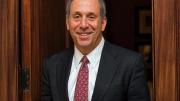Much of my writing since last spring has been devoted to the great challenges of the day: an extraordinary public health crisis, an unprecedented and rapid shift to online teaching and learning, a federal effort to keep international students from studying in America, and an increasing tendency to judge and condemn rather than to listen and debate. For diversity of calamities and issues—and dearth of opportunities for celebration and joy—this past year is unmatched by any other in my lifetime, a sentiment, I suspect, that is shared by many of you reading this column.
A member of my staff recently asked if I regret coming out of semi-retirement to lead Harvard, if I would have made a different choice given the benefit of foresight. My answer was no. Sadly, the hate and violence of Charlottesville, which convinced me that staying on the sidelines was not an option, has only become more brazen and more widespread. We are living at a time when the deep divisions in our society seem to threaten all that we hold dear. These days decency and kindness seem to be in exceedingly short supply. From my perspective, there is no better time to be contributing to the success of an institution that represents truth, excellence, and opportunity to so many everywhere, even if the work is very, very hard.
Fortunately, I do not undertake this work alone. I am writing this column on the heels of meetings with both the Board of Overseers and the Harvard Corporation. The individuals who comprise these groups bring with them extraordinary experience and expertise, as well as great devotion to Harvard and to higher education. Together, we consider the important issues that confront us, the competitive landscape in which we operate, and the strategies we try to pursue to make the University better. Our strong partnership yields good governance and enables Harvard to continue playing a significant role in repairing our world.
Our University helps humanity by delivering on its mission and by harnessing the ambition, talent, and goodwill of the members of our community. How do the members of the governing boards and I work together to achieve those ends? Especially in troubling times, I find comfort in returning to what I consider the basics. Anyone who has a hand in leading a college or university is fundamentally a steward of four pools of capital: financial capital, physical capital, human capital, and reputational capital. At Harvard, financial capital includes our endowment and financial assets; physical capital our campus and facilities; human capital our faculty, students, staff, and other academic personnel. Reputational capital is the belief—within and without Harvard—that the knowledge we produce and the students we educate make a positive difference. It flows from our teaching and research, as well as the values we represent in the wider world.
Good governance hinges on making decisions at the margin to move resources among financial, physical, and human capital with the goal of enhancing reputational capital—the impact of our teaching and scholarship. At any point, we can choose to turn one kind of capital into another: financial capital into human capital by hiring more faculty or supporting more students; physical capital into financial capital by deferring maintenance (generally not a good idea) or selling property, and so on. The constant challenge is determining where the greatest marginal return yields the greatest increase in our ability to deliver on our mission. In the end, we need people, space, and money to get anything done. There is a season for all things at Harvard.
The pandemic has offered precious few gifts, but it has reminded us in profound ways of the necessity—even the simplicity—of our work together. No one with experience in higher education would deny that it is nuanced. Yet it is the interplay of these four pools of capital that resonates across time and space. For me, the basics generate clarity in chaos, guiding decisions that help to remind us of the power of knowledge. In all times—but in challenging and dreadful times most of all—we can be comforted, emboldened, and propelled by that truth.









